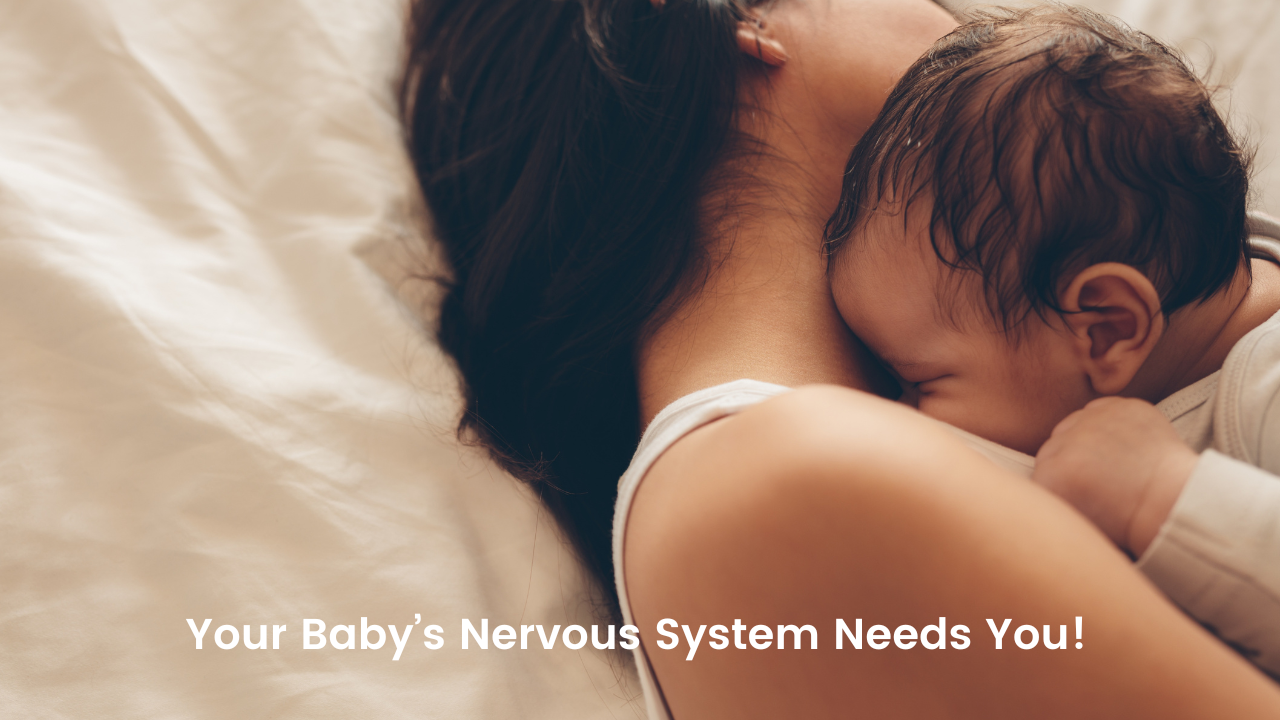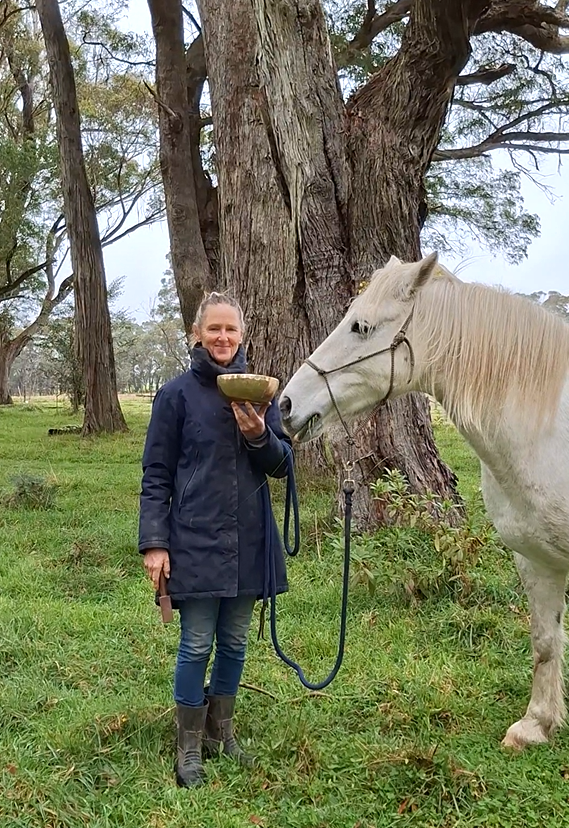
Your Baby’s Nervous System Needs You
The Case for Close Connection
As both a mother and a trauma-informed therapist and healer, I’ve come to deeply appreciate the critical importance from a nervous system perspective of early connection with our babies: Your baby needs you in ways you may not yet be aware!
I’ve recently had a few enquiries about bringing infants to the Airbnbs. My response is straightforward: my spaces aren’t set up for kids, and I don’t have any cots. Guests usually bring their own.
These conversations have prompted me to reflect on this topic: the profound need human babies have for proximity to their caregivers, especially in the early months.
And, as someone keen to support others through holistic wellbeing, I feel called to share this information.
The Journey from Womb to World
For nine months, your baby grows inside you, tucked snugly beneath your heart. During this time, they’re immersed in warmth, in your rhythm, hearing the steady beat of your heart, the subtle gurgles of your digestive system, and the soothing cadence of your voice.
These sounds are their world. They are comforted and regulated by the constancy of your presence, every sound and vibration information to their developing nervous system.
And then, they’re born.
Suddenly, this tiny being is thrust into a world filled with unfamiliar sights, sounds, and sensations.
The warmth and security they once knew is replaced by a whirlwind of stimuli. Yes, birth is a traumatic experience for just about everyone!
Why Proximity Matters for Your Baby’s Nervous System
From a nervous system perspective, your baby needs you now, more than ever.
Human infants are born with immature nervous systems, and they rely heavily on their caregivers for co-regulation – a process where the calm, steady presence of a caregiver helps stabilise the baby’s emotions and physiological responses.
When you hold your baby close, they can:
- Hear your heartbeat: A familiar rhythm that reassures them of safety.
- Feel your warmth: A physical reminder of their secure environment.
- Sense your breathing: A pattern that encourages their own breath to regulate.
- Experience touch: A grounding sensation that promotes emotional stability.
This isn’t just emotional or instinctual, it’s biological.
A baby’s nervous system is still developing, and proximity to their caregiver plays a crucial role in shaping how their system learns to respond to stress, to self-soothe, and find calm. (THIS is regulation)
The Long-Term Impact of Early Connection
So much of who we are as adults – our ability to regulate emotions, manage stress, and maintain healthy relationships – traces back to those early experiences. When a baby’s needs for closeness and co-regulation are met, their nervous system develops in a way that fosters resilience and security.
Unfortunately, the opposite is also true. When infants are left to “self-soothe” too early or are consistently separated from their caregivers, their nervous systems may struggle to find balance. This can lead to patterns of dysregulation that manifest later in life as anxiety, depression, other so-called “mental health conditions”, addictions and so on.
From my perspective, most of these challenges are not ‘disorders’ but simply symptoms of a nervous system that was unable to develop optimally due to unmet needs in infancy.
Rethinking Sleep Arrangements
This brings me to the question: Why don’t you sleep with our baby? Why use a cot?
In our culture, there’s been a strong push toward independence from birth – cribs, nurseries, and devices designed to separate parents and babies. While these tools may have their place, it’s worth questioning whether they’re in the best interest of our little ones.
Sleeping close to your baby, whether through bed-sharing or co-sleeping in a safe arrangement, allows for continued co-regulation. It keeps the bond strong and supports their nervous system in ways that no gadget or product can replicate.
A Duty to the Next Generation
We live in an age of growing awareness. Research into attachment theory, the nervous system, trauma and early childhood development has given us deeper insights into what babies truly need.
With this knowledge comes responsibility—a duty to support the next generation in ways that foster their well-being from the very start.
If you’re a parent, or know someone with a newborn, consider the profound impact of staying close. It’s not about perfection or adhering to every new parenting trend; it’s about recognising the biological and emotional needs of your child and doing your best to meet them.
Practical Suggestions for Supporting Your Baby
If you’re open to incorporating more connection into your baby’s routine, here are some ideas:
- Hold Them Often: Skin-to-skin contact isn’t just for the early days—it’s beneficial at any stage.
- Wear Your Baby: Baby carriers and wraps keep your little one close while giving you mobility.
- Co-Sleep Safely: If you choose to share a bed, research guidelines to ensure it’s done safely.
- Respond to Their Cries: It’s natural for babies to seek comfort—being responsive builds trust.
- Slow Down: Life can be hectic, but moments of calm connection mean the world to your baby.
A Note on the Cot Industry
I want to be clear that I mean no disrespect to manufacturers of cots, cribs, and related products. These items can be incredibly helpful for families and are often designed with safety in mind. However, it’s important to balance their use with an understanding of what truly supports a baby’s development.
The health of a child’s nervous system and overall well-being should always take precedence over convenience or commercial interests.
In Closing
Parenting is a journey filled with choices, and there’s no one-size-fits-all approach. But as we navigate this path, it’s worth pausing to ask: What does my baby truly need?
From my perspective, the answer is simple yet profound: They need you. Your presence, your heartbeat, your love.
These are the foundations upon which they build their sense of safety and security in the world.
So, if you’re able, hold them close. Sleep with them. Let their tiny nervous system find balance in the rhythm of your care.
In doing so, you’re not just nurturing their infancy – you’re laying the groundwork for a lifetime of emotional and physical well-being.
P.S.
Mistakes are part of being human – it’s how we learn and grow. You are a work in progress.
Life isn’t about getting everything perfectly right, but about striving to do better. FOR YOUR BABY’S SAKE, embrace the journey with them and aim to create the best outcomes you can for them.
Professional support for adults
Highlands Centre For Healing can offer you this support. Set in nature, which beautifully supports our nervous system, Soo will provide a nurturing environment in which you can explore and process your life experiences.
A trauma trained somatic therapy and energy healer, sessions with Soo are always tailored to the individual’s needs. She’s ready to support you when you are ready to start the journey.
Related articles:
What Is Somatic Therapy? – Guide
We’re just here when you’re ready to gently unpack and process your trauma.
About the Highlands Centre for Healing
We offer holistic wellbeing for mind, body and soul bringing together a range of alternative, complementary wellbeing practices united by one single intention – to help you heal and find wellness. Join us for community or corporate group programs, workshops and retreats, or private equine therapy experiences.
